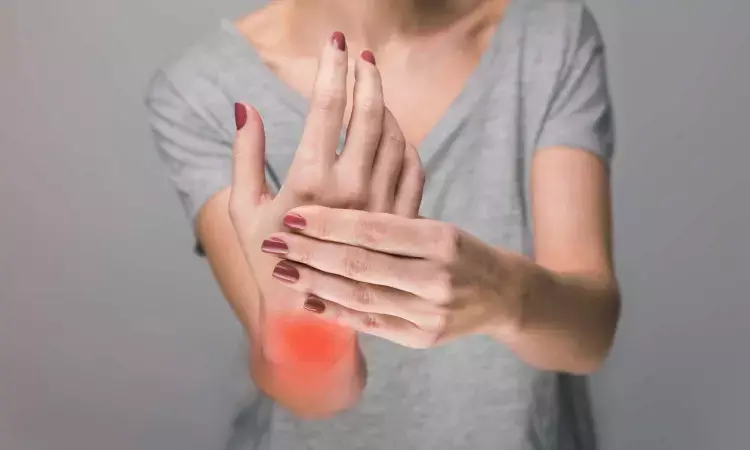- Home
- Medical news & Guidelines
- Anesthesiology
- Cardiology and CTVS
- Critical Care
- Dentistry
- Dermatology
- Diabetes and Endocrinology
- ENT
- Gastroenterology
- Medicine
- Nephrology
- Neurology
- Obstretics-Gynaecology
- Oncology
- Ophthalmology
- Orthopaedics
- Pediatrics-Neonatology
- Psychiatry
- Pulmonology
- Radiology
- Surgery
- Urology
- Laboratory Medicine
- Diet
- Nursing
- Paramedical
- Physiotherapy
- Health news
- Fact Check
- Bone Health Fact Check
- Brain Health Fact Check
- Cancer Related Fact Check
- Child Care Fact Check
- Dental and oral health fact check
- Diabetes and metabolic health fact check
- Diet and Nutrition Fact Check
- Eye and ENT Care Fact Check
- Fitness fact check
- Gut health fact check
- Heart health fact check
- Kidney health fact check
- Medical education fact check
- Men's health fact check
- Respiratory fact check
- Skin and hair care fact check
- Vaccine and Immunization fact check
- Women's health fact check
- AYUSH
- State News
- Andaman and Nicobar Islands
- Andhra Pradesh
- Arunachal Pradesh
- Assam
- Bihar
- Chandigarh
- Chattisgarh
- Dadra and Nagar Haveli
- Daman and Diu
- Delhi
- Goa
- Gujarat
- Haryana
- Himachal Pradesh
- Jammu & Kashmir
- Jharkhand
- Karnataka
- Kerala
- Ladakh
- Lakshadweep
- Madhya Pradesh
- Maharashtra
- Manipur
- Meghalaya
- Mizoram
- Nagaland
- Odisha
- Puducherry
- Punjab
- Rajasthan
- Sikkim
- Tamil Nadu
- Telangana
- Tripura
- Uttar Pradesh
- Uttrakhand
- West Bengal
- Medical Education
- Industry
Peresolimab effective in the treatment of rheumatoid arthritis: NEJM

Peresolimab showed effectiveness in rheumatoid arthritis patients in a phase 2a study, says an article published in The New England Journal of Medicine. Peresolimab is a humanized IgG1 monoclonal antibody that stimulates the natural PD-1 inhibitory mechanism. Stimulating this route might be a unique method to treating people suffering from autoimmune or autoinflammatory illnesses. As a result, Jay Tuttle and Tam undertook this study to evaluate the efficacy of peresolimab in the treatment of rheumatoid arthritis.
In this phase 2a, double-blind, placebo-controlled trial, randomized, adult patients with moderate-to-severe rheumatoid arthritis who had an inadequate response, loss of response, or unacceptable side effects with conventional synthetic DMARDs or biologic or targeted synthetic DMARDs were randomly assigned to receive 700 mg of peresolimab, 300 mg of peresolimab, or placebo intravenously once every 4 weeks.
The primary outcome was the change in the Disease Activity Score for 28 joints according to C-reactive protein level (DAS28-CRP) from baseline to week 12. The DAS28-CRP scale is 0-9.4, with higher levels suggesting more severe illness. The main comparison was between the 700-mg and placebo groups. ACR20, ACR50, and ACR70 responses, which are improvements from baseline of 20%, 50%, and 70% or more in the number of tender and swollen joints and in a minimum of three of five significant domains, respectively, were secondary outcomes that were measured at week 12.
The key findings of this study were:
1. At week 12, the DAS28-CRP had considerably changed from baseline in the 700-mg peresolimab group compared to the placebo group.
2. The 700-mg dosage was preferred above the placebo according to the analysis of secondary outcomes for the ACR20 response, but not for the ACR50 and ACR70 responses.
3. In both the peresolimab and placebo groups, there were comparable adverse events.
Reference:
Tuttle, J., Drescher, E., Simón-Campos, J. A., Emery, P., Greenwald, M., Kivitz, A., Rha, H., Yachi, P., Kiley, C., & Nirula, A. (2023). A Phase 2 Trial of Peresolimab for Adults with Rheumatoid Arthritis. In New England Journal of Medicine (Vol. 388, Issue 20, pp. 1853–1862). Massachusetts Medical Society. https://doi.org/10.1056/nejmoa2209856
Neuroscience Masters graduate
Jacinthlyn Sylvia, a Neuroscience Master's graduate from Chennai has worked extensively in deciphering the neurobiology of cognition and motor control in aging. She also has spread-out exposure to Neurosurgery from her Bachelor’s. She is currently involved in active Neuro-Oncology research. She is an upcoming neuroscientist with a fiery passion for writing. Her news cover at Medical Dialogues feature recent discoveries and updates from the healthcare and biomedical research fields. She can be reached at editorial@medicaldialogues.in
Dr Kamal Kant Kohli-MBBS, DTCD- a chest specialist with more than 30 years of practice and a flair for writing clinical articles, Dr Kamal Kant Kohli joined Medical Dialogues as a Chief Editor of Medical News. Besides writing articles, as an editor, he proofreads and verifies all the medical content published on Medical Dialogues including those coming from journals, studies,medical conferences,guidelines etc. Email: drkohli@medicaldialogues.in. Contact no. 011-43720751


